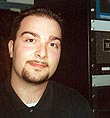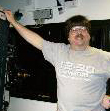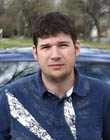|
|
This topic comprises 2 pages: 1 2
|
|
Author
|
Topic: Booth Cleaning
|
|
|
|
|
|
|
|
|
|
|
Dominic Espinosa
Phenomenal Film Handler

Posts: 1172
From: California, U.S.A.
Registered: Jan 2004
|
 posted 07-25-2004 10:50 AM
posted 07-25-2004 10:50 AM




How many screens is that thing anyway?
I just took over a 6 house booth back in February...It's been somewhat stable now for only a couple months. I know what you mean by filthy.
The first priority when I started on it was to get the projectors clean and the film off the floor. The old projectionists believed in pulling all the leader out onto the floor, throwing it over the projector threading it down and throwing the leader back to the platter. After threading THE RIGHT WAY your hands would have dust all over them from threading. They never mopped.
So, here's what you do. Get those clean, get the film off the floor, etc. Then I blew out all the sound racks and such with compressed air for cleaning electronics.
Finally I did a fair amount of sweeping, I'm not sure if the vacuum we have has a H.E.P.A filter. Next came the mop and bucket.
The booth now gets mopped bi-weekly and it works pretty well. Since the film never gets on the floor we're pretty good.
The next part after getting the real filth out of there was to clean all the optical componants. Lenses, sound readers, etc. Then the platter work. We have AW3's that were absolutely filthy. Over the course of the next couple months I took each deck apart on all the platter systems, degreased and cleaned the brains. Each deck got a thorough cleaning and fresh grease. (Not in the brains!!! DON'T GREASE BRAINS!)
The lamp houses are going to have to wait for the most part until their respective bulbs get changed out, I don't want to stir up all the sh*t in them right now. As long as the cooling isn't highly affected it'll wait. However cleaning the reflectors is a good plan if you've got a steady enough hand to work around the bulb. Hell, if you're really going for broke I guess you could take the bulbs out.
And finally keeping it clean...This is the hardest part of all.
I made up a spreadsheet in excel that has everything to be done and it's frequency, weekly, biweekly, monthly, etc. And a separate one which I post up in the booth every Thursday night that shows what needs to be done on what day.
Each house gets cleaned once a week and the port glass twice a week, etc. You get the idea. Frequency will vary depending on your booth but getting into the habit is all it takes.
G'luck.
| IP: Logged
|
|
|
|
|
|
Randy Stankey
Film God

Posts: 6539
From: Erie, Pennsylvania
Registered: Jun 99
|
 posted 07-25-2004 03:53 PM
posted 07-25-2004 03:53 PM




Also, I suggest you develop a pattern to your cleaning and sweeping practices. If you don't you'll end up pushing dirt around from one place to another without really cleaning it up.
For instance:
Dust the tops of projectors, shelves and window ledges first. Knock the dirt down from high places to the floor. Use a fuzzy duster, a Swiffer or a clean cloth sprayed lightly with some kind of dusting spray like Endust.
Use a small broom and/or a shop vac to clean under tables & equipment, get dirt out of corners and away from baseboards. Be sure to move objects like chairs and trash cans while you clean. Don't just sweep around them!
Use a push broom to clean up the coarse dirt particles and small bits of trash then use a dust mop to clean up the fine "gritty" dust. Start in one end of the room and work toward the other. Work from the interior of the room toward the doors to avoid pushing dirt farther into the room.
Use dusting spray or sweeping compound if you can. In some states the use of sweeping compound is illegal in public buildings because it can make the floors slippery. Check what kinds of chemicals are safe for use in your area/buildings.
Sweep SLOWLY to prevent the dirt from getting "puffed" up into the air, only to settle back in areas where you just cleaned. Don't beat the broom on the ground at the end of each stroke like I see some people do. It only puffs dust into the air.
Damp mop the areas you sweep with a clean mop using hot/warm water and a moderate amount of floor cleaner. (Mister Clean or whatever.) Don't use too much! Also, don't saturate too much water on the floors. Wring the mop out till it's almost dry. If too much water gets on the floors, it can ruin the tile. Also it takes longer to dry and it can create a slip and fall hazard.
Once done, take your mop to a seperate room to clean it out. Wash the dirt out of the bucket with a stream of water. Rinse ALL of the dirt out of the mop then hang it up to dry. If you leave the mop and bucket standing in a corner somewhere it will just turn into "Swamp Water". It won't be good for cleaning anything.
Take your push broom and dust mop(s) OUTSIDE and beat the dust out of them before hanging them up. Respray them with dusting spray before putting them away. (Unless the directions on the container say different.)
Repeat the cleaning OFTEN! A booth which has been kept clean will tend to stay cleaner over time. You can sweep/clean a room every day for a month then skip a day or two but the reverse is not true. If a room is extremely dirty you'll probably have to give it a good "going over" two or three times before you start to make a dent in it.
Even if you don't think my cleaning patterns will suit you, it's important that you do develop some kind of pattern. It's also important to write down a schedule for cleaning and stick to it. If you are supposed to clean the booth every Monday, Wednesday and Friday then be damn sure that it gets done on those days or your whole cleaning program will be for naught.
| IP: Logged
|
|
|
|
Andrew Shingleton
Film Handler
Posts: 63
From: Richmond, Victoria, Australia
Registered: Feb 2004
|
 posted 07-25-2004 05:49 PM
posted 07-25-2004 05:49 PM




In regards to scheduling, we actually use a spreadsheet that has a list of jobs along with the frequency that each job should be repeated. The spreadsheet calculates how many days it's been since the job was last done, and provides a countdown of days until the task is overdue. The aim is to make sure that nothing ever goes "overdue", by doing the task within it's time frame.
The advantage of this over a list of weekly tasks is that it's not as easy to ignore tasks that haven't been done. If mopping is designated to be done on mondays for example, but one particular monday is really busy, it might be put off until the following monday rather than being made up for sooner. With the "overdue" system, the mopping task is going to be highlighted red until it's done again, which is a lot harder to ignore. The other advantage is that it's a lot more flexible, and is a lot easier to track tasks that are done more often than weekly, but less often than daily. And it can be easily changed depending on results - if a 7 day mopping cycle isn't quite cutting it, we could simply change the 7 to a 5 to increase the frequency.
We use this system for almost all the tasks that need to be done except for the things that are hard to predict when they will happen, like filmwork, etc.
| IP: Logged
|
|
|
|
|
|
|
|
|
|
|
|
All times are Central (GMT -6:00)
|
This topic comprises 2 pages: 1 2
|
Powered by Infopop Corporation
UBB.classicTM
6.3.1.2
The Film-Tech Forums are designed for various members related to the cinema industry to express their opinions, viewpoints and testimonials on various products, services and events based upon speculation, personal knowledge and factual information through use, therefore all views represented here allow no liability upon the publishers of this web site and the owners of said views assume no liability for any ill will resulting from these postings. The posts made here are for educational as well as entertainment purposes and as such anyone viewing this portion of the website must accept these views as statements of the author of that opinion
and agrees to release the authors from any and all liability.
|

 Home
Home
 Products
Products
 Store
Store
 Forum
Forum
 Warehouse
Warehouse
 Contact Us
Contact Us




 Printer-friendly view of this topic
Printer-friendly view of this topic






![[Smile]](smile.gif)





![[Wink]](wink.gif) )
)







